Petunias in landscape design: planting and beautiful design of the site
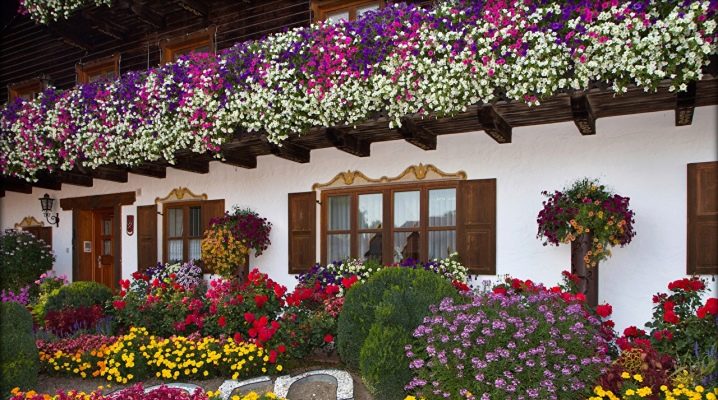
Petunia belongs to the nightshade family, like potatoes. Until the 19th century, she lived a quiet and inconspicuous life, until the delicate pretty flowers were considered by breeders. They grew on its basis hybrid varieties, which gave rise to decorative species. Today, every self-respecting owner of a summer house, suburban area or balcony is trying to plant this amazing plant.
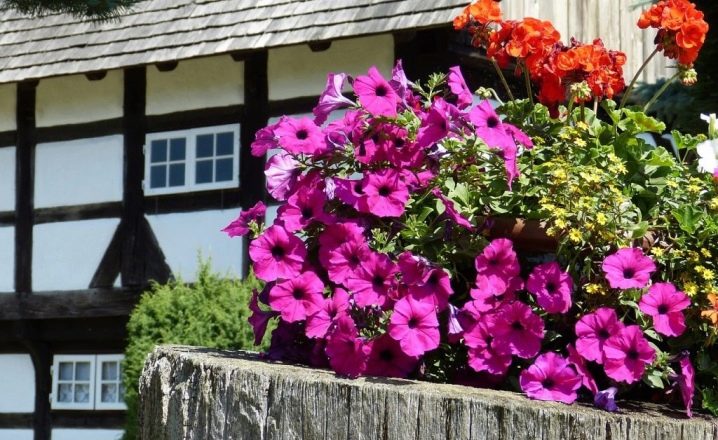
Suitable types of petunias
Petunias are so adorable that from any species in the garden you can make a real masterpiece composition. To make it easier to choose a plant for your site, you need to familiarize yourself with their varieties.
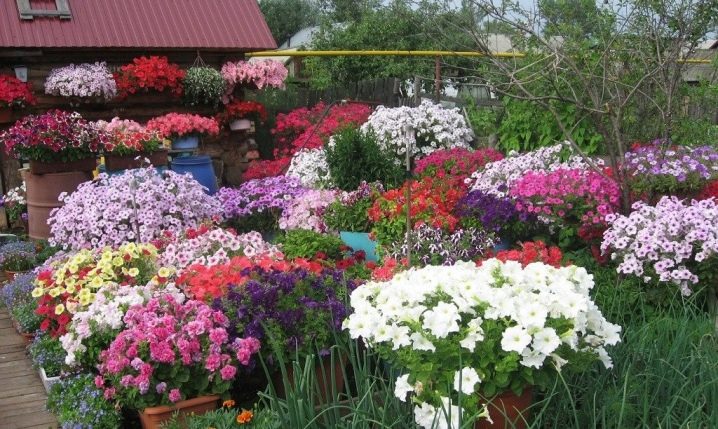
By flower size, they are divided into groups of varietal series.
- Floribunda and multiflora. These types of petunias include multi-colored varieties with a flower diameter of up to 7 centimeters. They tolerate weather conditions well, even after prolonged precipitation, they fully recover in 2-3 days.
- Milliflora - miniature varieties of petunias with small cute flowers up to 4 centimeters in diameter. These crumbs also react steadily to precipitation, quickly recover and delight with their wonderful appearance.
- Grandiflora - real giants among relatives, the diameter of their inflorescences reaches from 10 to 15 centimeters. The rains do not tolerate well - there is a fall and decay of the flower cover, and they need at least a week to recover.
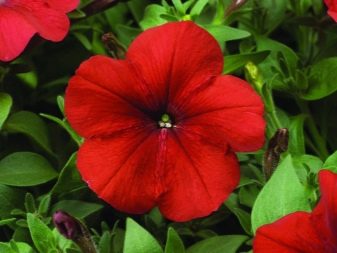
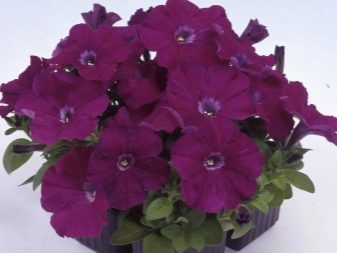
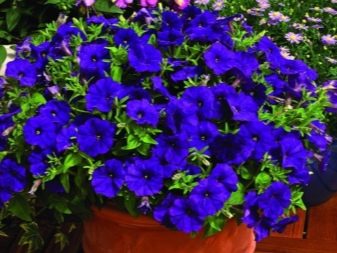
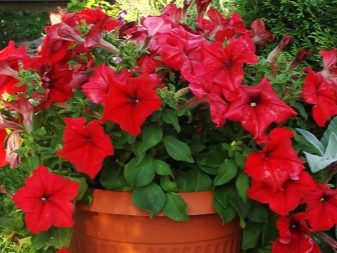
Using petunias in your garden, it should be remembered that grandiflora varieties are not suitable for open ground, it is better to plant them in pots and containers, on balconies and verandas on the sunny side, and for flower beds it is better to use small and medium plant varieties.
In addition to size, petunias are divided into double and regular. Terry does not depend on the volume of the flower; it can touch the entire petal or only its edge.
The difference between plants occurs in the type of growth and height. In this case, they are divided into cascading, cluster and ampelous. Including petunia in the design of the garden, you should take into account the peculiarities of its growth.
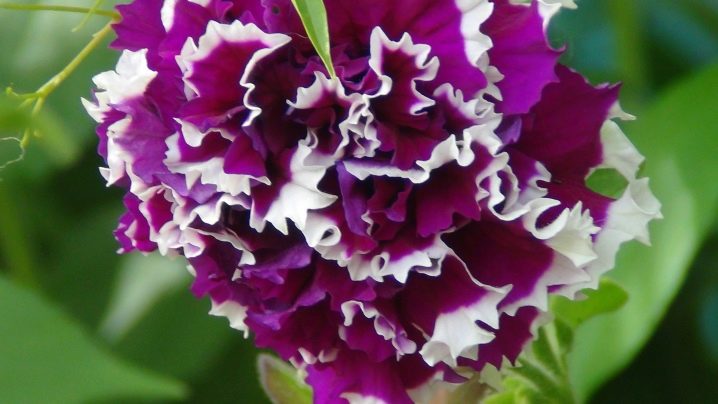
Cascading
The name speaks for itself. These varieties of petunias have long, thin shoots (up to 150 cm), which, falling from the flowerpots, give the impression of a flower cascade. They are often decorated with balconies, verandas, terraces. It is also possible to apply this type of plant in landscaping by raising the pots higher above the ground. The following cascading varieties are suitable as a decoration for the site:
- "Tornado" - grows in long shoots with flowers up to 5 centimeters in diameter. The plant is unpretentious and resistant to weather conditions.
- "Fortunia" Is an excellent hybrid with abundant flowering. Well suited for growing in tall garden beds.
- "Typhoon" - throws out giant stems up to one and a half meters long, only frosts can stop its flowering.
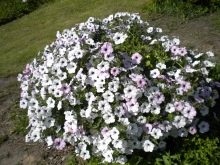
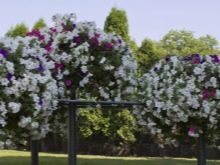
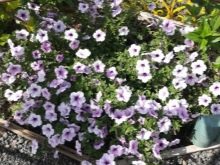
Ampelny
These varieties are difficult to distinguish from cascading ones, but there is still a difference. The maximum length of shoots of ampel petunias reaches 120 centimeters, and of cascading ones - 150. The stems of ampel varieties grow immediately downward, they can envelop a flower pot. Cascading shoots move up, and then fall to the sides, have flowers of the same size. Inflorescences of ampel varieties differ in different diameters, even on the same bush.
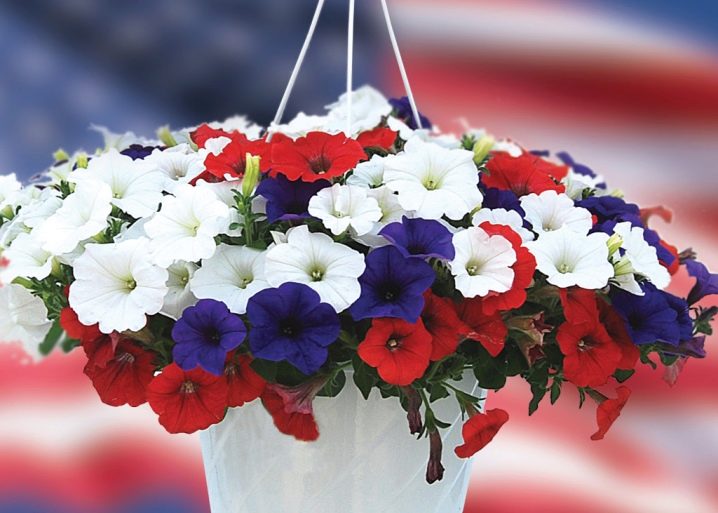
When choosing a similar petunia for landscape design, you should know that you need to plant it separately from other flowers. This is due to the rapid growth of stems, which interfere with the growth of neighbors.
The following varieties are well suited for terraces, verandas and elevated areas around the house.
- "Vander Wave" - has strong branchy shoots up to 1 meter long. The maximum flower size is 7 centimeters. The variety is not afraid of rain and wind. After difficult weather conditions it quickly regains its original appearance.
- "Ramblin" - a favorite variety of gardeners, the plant is heterogeneous, it can release shoots up to 1 meter in length. Has ten varieties of color.
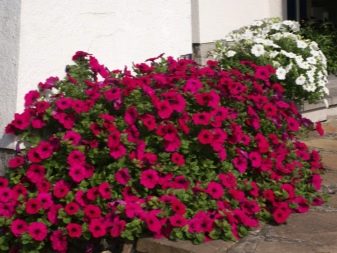
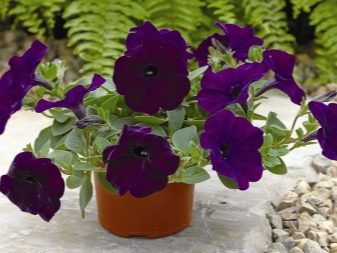
Bush
Bush varieties of petunias behave more compactly, they get along well with neighbors and form beautiful flower beds.
In landscape design, you can use the following bush varieties.
- "Fantasy" - belong to the milliflora group. Forms very beautiful bushes up to 20 centimeters high with a scattering of delicate uniform flowers.
- "Triumph" - incredibly beautiful double flowers of different colors, reaching a size of 16 centimeters in diameter. They react poorly to difficult climatic conditions. The garden can be placed in semi-enclosed spaces, under awnings, but with sufficient lighting.
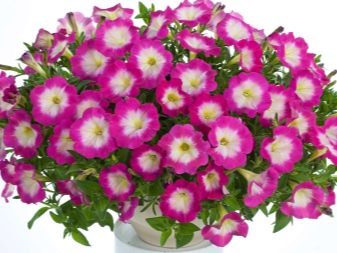
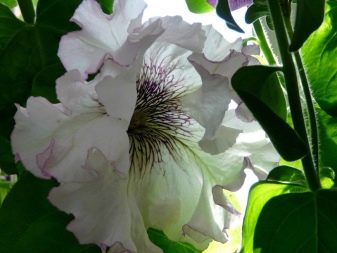
What plants can you combine with?
Bush petunia is a fairly friendly plant that gets along well with other flowers. The selection of companions should be made based on the following criteria:
- color spectrum;
- harmony of forms;
- sizes;
- method of growth and cultivation;
- seasonal coincidences and differences.
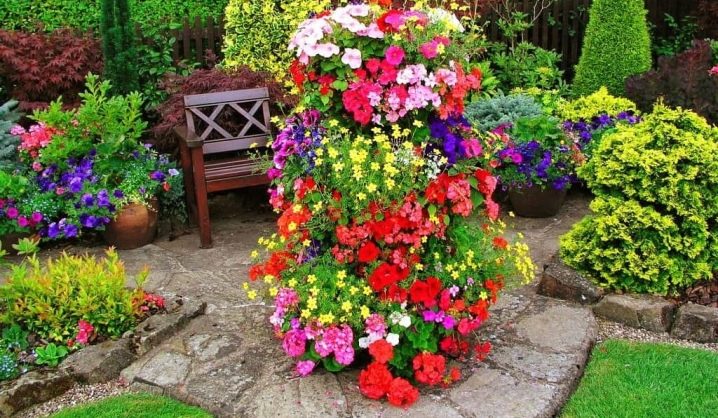
Petunia goes well with spring flowers, but you need to remember that petunia blooms for a long period of time, so at the beginning of summer you will have to carefully clean the flower bed of already dried spring neighbors. After these steps, the flower garden should not look like a patch of bald patches.
Therefore, daffodils, hyacinths, crocuses and tulips should be planted next to petunias along well-thought-out geometric lines that will be effective even after the removal of dead vegetation.
To make it easier to choose flowers for landscape design, we suggest looking at the photos of harmonious combinations of petunias with specific plants.
- You can emphasize the riot of colors of petunia with an openwork contour silvery cineraria.
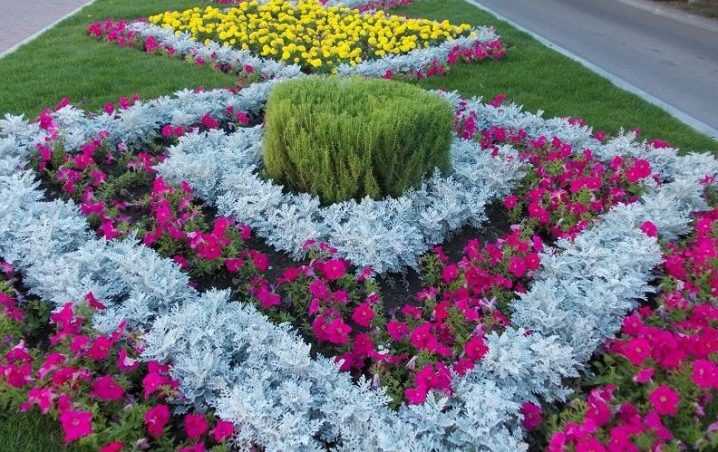
- Lobelia - a huge ball of small flowers, competes with petunia in its brightness and splendor, but at the same time they get along well with each other. Even ampelous varieties do not shade the lobelia if it is placed in the center, and the shoots of the petunia hanging from the flowerpot are directed downward.
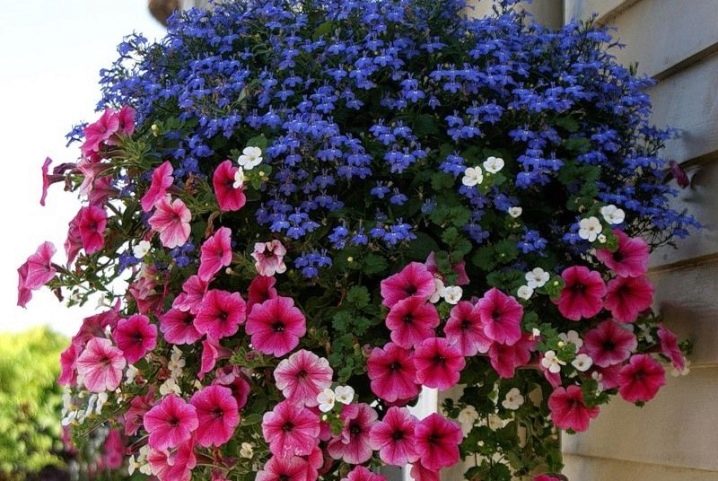
- The photo shows an example of unity marigolds, cineraria and petunias. They come in contrast to the stone design of the flower bed. Such a bright oasis among the monotonous greenery of the surrounding landscape combines the energy of life and the philosophical peace of stone.
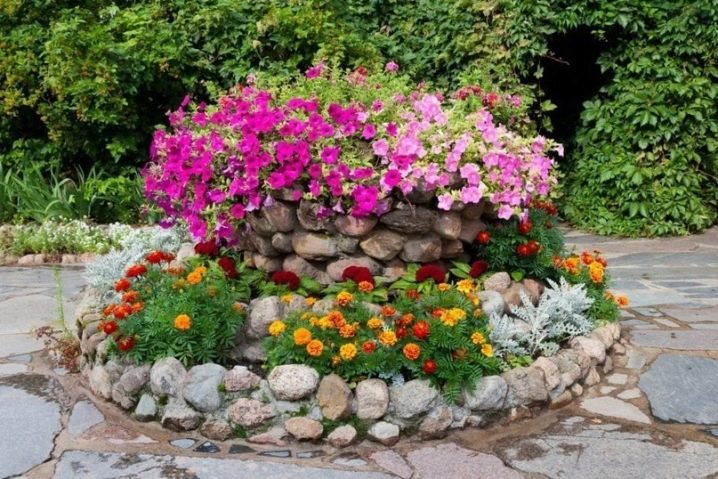
- Fascinating ampel mixes vervains with petunia. Shape, color, size - everything is different, but the flowerbed looks harmonious.
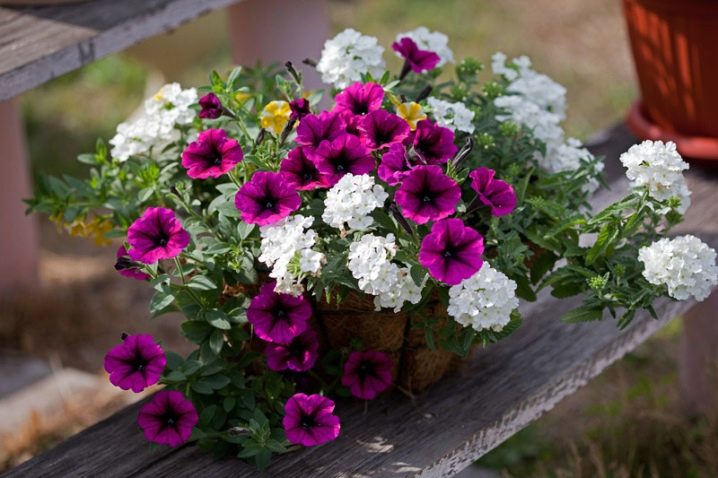
- Carved leaves go well with cascading petunia fern... The fern heads the flowerbed, sitting in the center of the exposition, and bright flowers tend to fall like a waterfall.
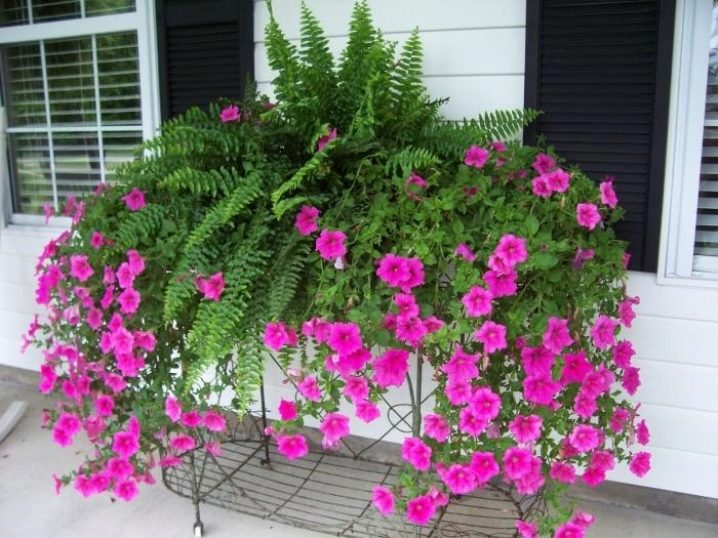
Seat selection
Petunia is able to decorate any design landscape, wherever it is: on the backyard of a country house, in the country garden or in the yard. The main thing is that the place is open to enthusiastic views and the sun. The plant is very sun-loving, but in hot climates it is better to have a light shade from a garden tree or fence. The full shade of the flowerbed will not tolerate well, the stems will become thinner and elongated, and the flowers will become small and fade.
Petunia loves fertile soil with the presence of clay or sand, you can add peat. Before planting in open ground, the soil should be thoroughly loosened to enrich it with oxygen.
Petunia flower beds can be planted on a green lawn or planted in lush bushes along the paths leading to the house. The facades of buildings and grand staircases are decorated with vegetation in flowerpots.
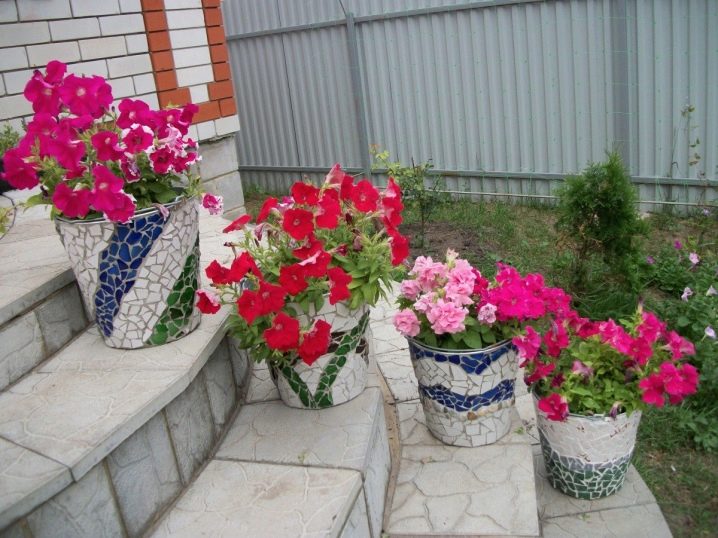
Site design options
To decorate a personal plot beautifully, work should begin with a diagram. All objects of landscape design should be displayed on it. The flower beds are built not only taking into account the aesthetic appearance, but also with the benefit of the plants. Some species like coolness and shade, while others like warmth and a lot of light.
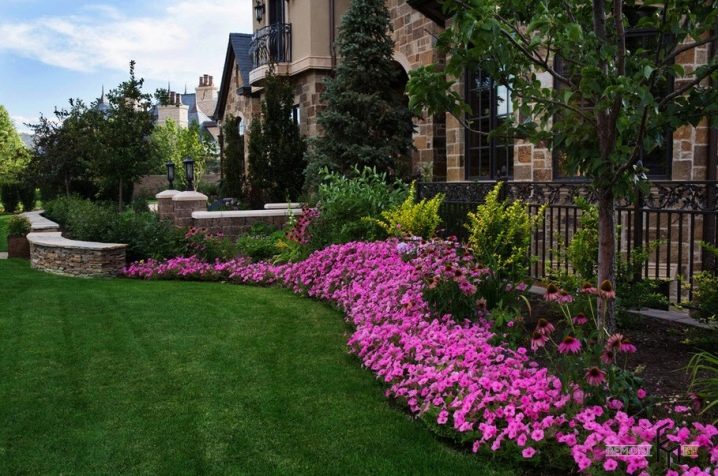
Some flowers cannot stand drafts or dampness, which means they should not be placed in lowlands. When planting, you should take into account the wind rose. This also applies to petunias - they do not like stagnant water, suffer from wind and lack of sun. Vertical flower beds are a good choice for them.
Vertical flower beds
Petunia does well in containers, flowerpots and pots. Especially for it, vertical structures (towers) are made of metal mesh and cellophane, on which it is overgrown from top to bottom with a flower carpet, advancing on the soil.
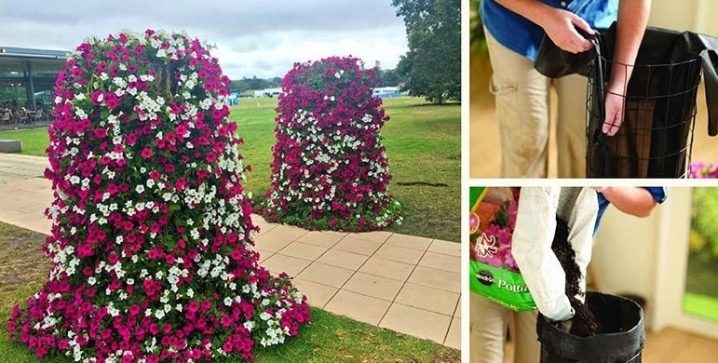
The type of vertical landscaping includes gazebos and arches containing containers of flowers. They impress with the abundance of colors and the charm of flowers.
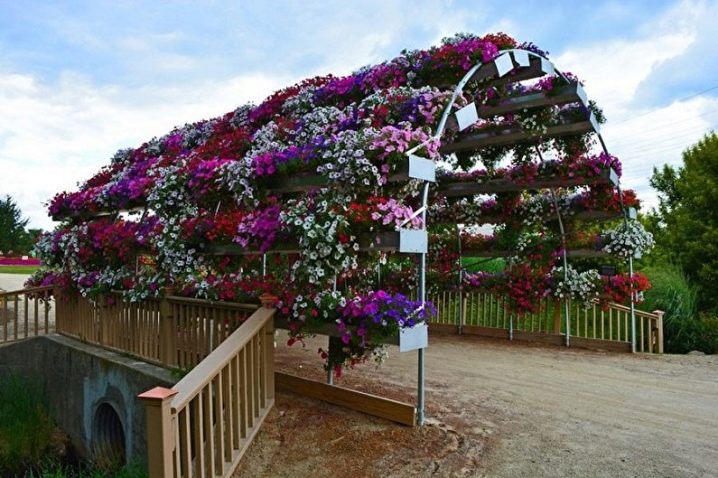
Vertical flower beds can be arranged by fixing containers with flowers on a wooden building or by placing the pots on a frame in the form of a slide, prepared in advance.
Pots for cascading and ampelous species should contain drainage holes and be spacious enough.
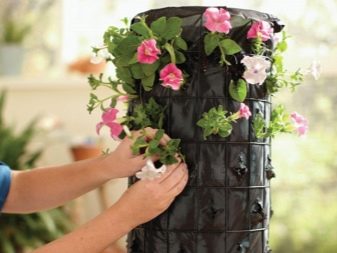
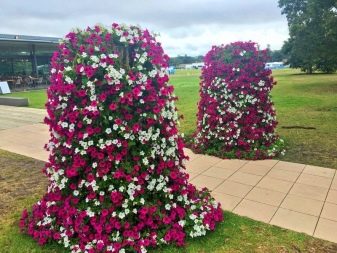
Round flower beds
Round flower beds are arranged in several types. Traditionally, a circle is broken on the site and petunias are planted. It can be of the same color or different shades. Often companions (representatives of other families) are planted with it, borders are made of stunted plants.
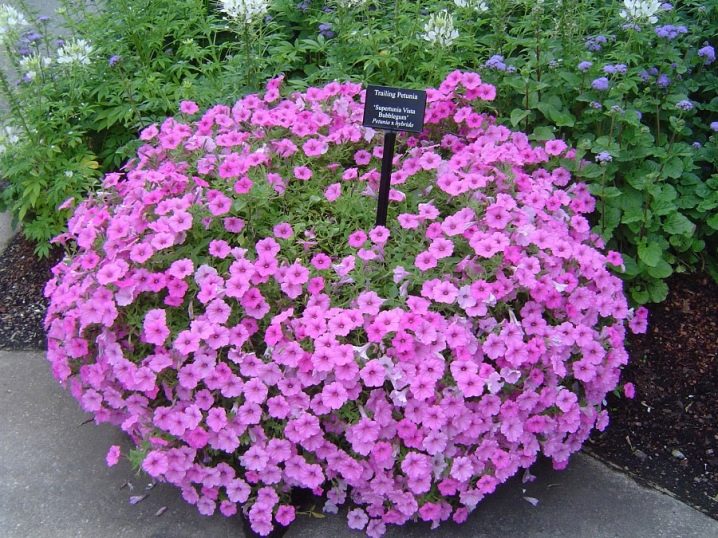
The second type of plantings is a ball-bed, most often grown in a single flowerpot. This is an amazing living creature, from which it is difficult to divert an admiring glance.
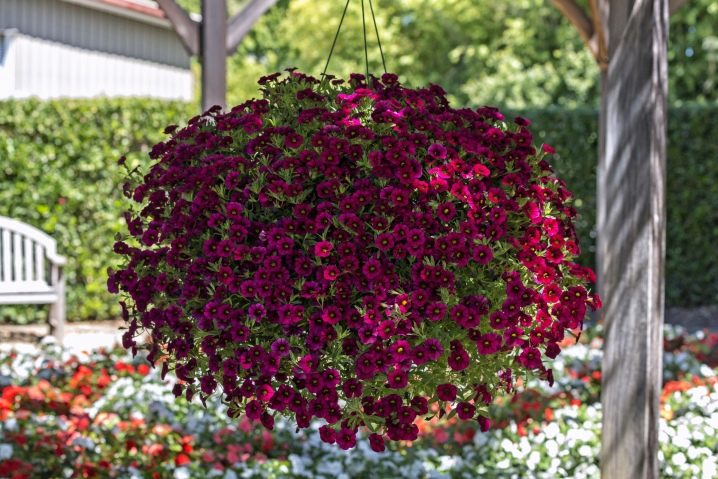
Monoclumba
Ideally, if you plant one type of petunia on a monoclumba, observing a single color. Any of its shades will suit a green lawn. You can break several solo flower beds, but with a different palette of colors... A variegated plantation of one type of petunia can also be considered a monoclumba.
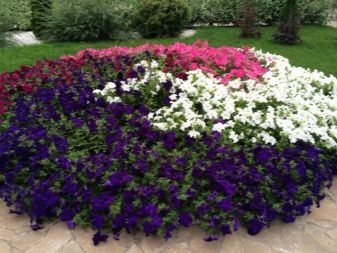
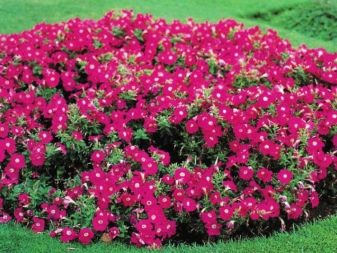
How to care for the composition?
You can't make a flower garden and forget about it. Of course, the flower bed requires care, and the better it is, the more positive you can get from the plants.
It is necessary to ensure that the soil on the flowerbed does not dry out and does not crack. Daily gentle watering in the morning or evening will keep the plants fresh and vigorous. Periodically, you can organize watering with top dressing - this will help the plant grow in a lush ball. You can fertilize petunia with organic matter (ash, manure) or mineral phosphates.
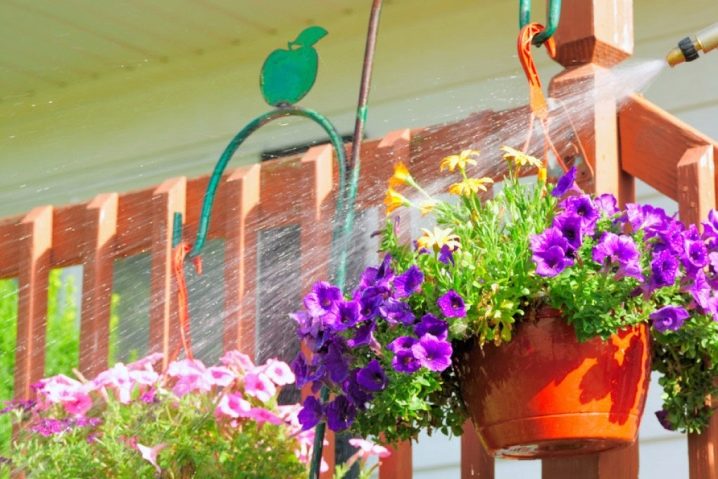
Successful examples
When you admire petunias in the country or city flower beds, every example of a flower garden seems to be successful. But we will try to make a selection of the most interesting compositions.
- On a fresh lawn from multi-colored petunias, you can make any cheerful composition.
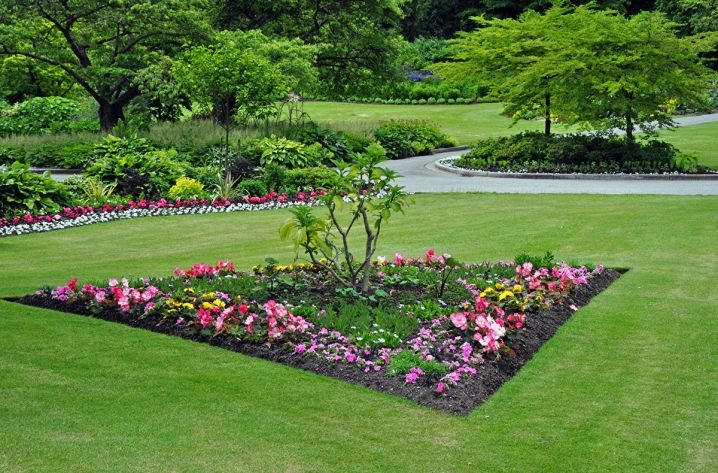
- Both people and plants liked the idea of a flower-bed hedge. They feel great on a vertical wall and delight others with their beauty.
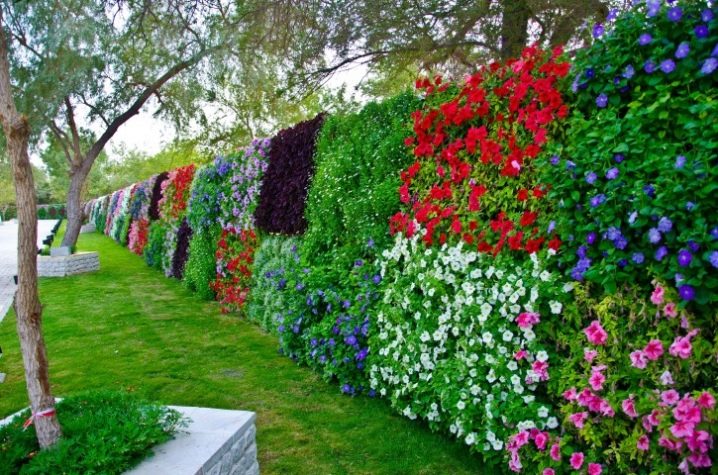
- Petunias bring a vibrant palette to landscape design ideas.
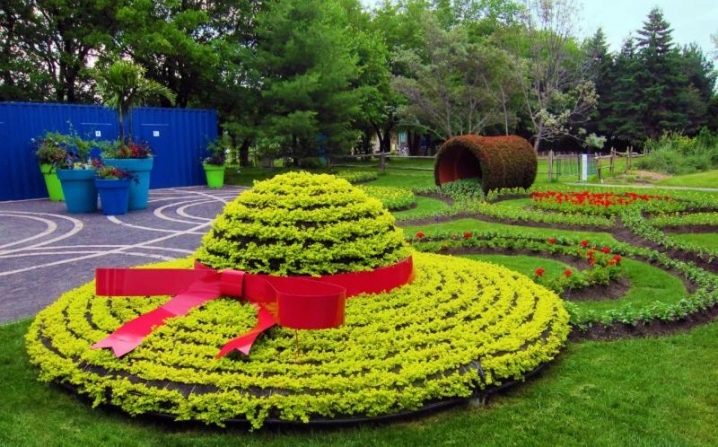
- The bouquet of terry flowers in a garden flowerpot is charming in its simplicity.
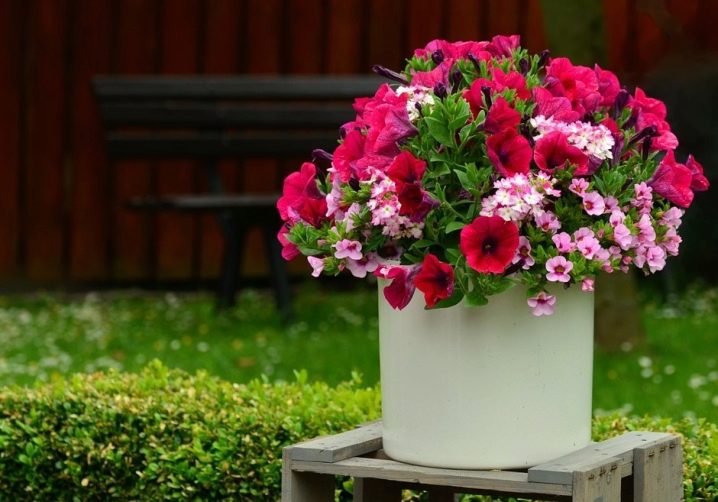
- Sculptural shoes sprouted with petunia can be installed anywhere in the garden, decorate the porch, veranda or park recreation area.
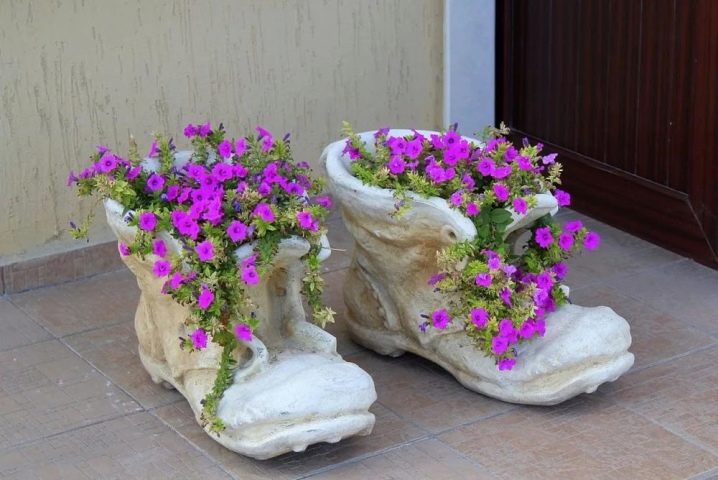
- In landscape design, sculptural compositions surprise and delight most of all.
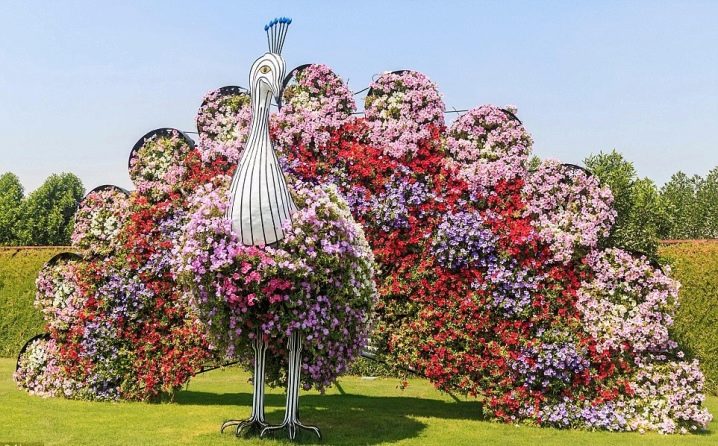
- A variegated abundance of petunias decorates a residential building.
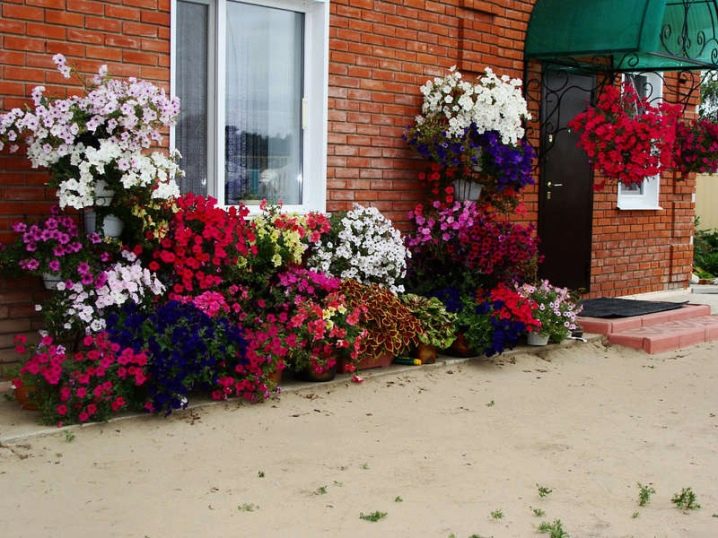
- Looking at the photos, you understand that flower beds can be made from literally everything. Petunias settled and refined the old decorated bath, the same "ancient" chair, bicycle, galoshes.
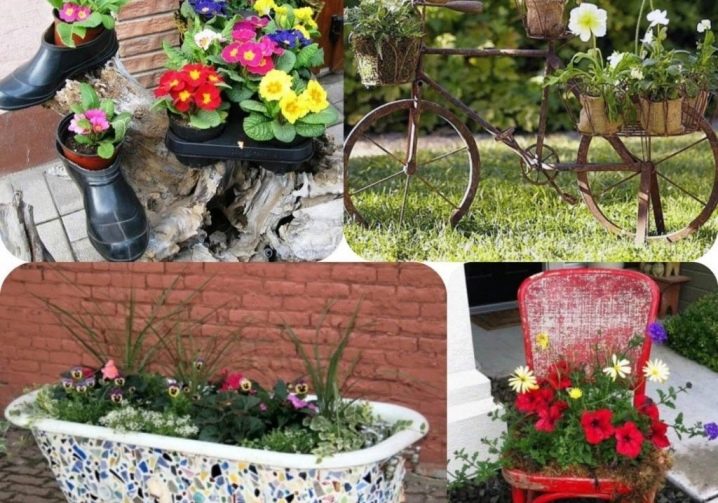
- The previous topic can be continued: the flowerbed has decorated an old cart, a wheelbarrow.
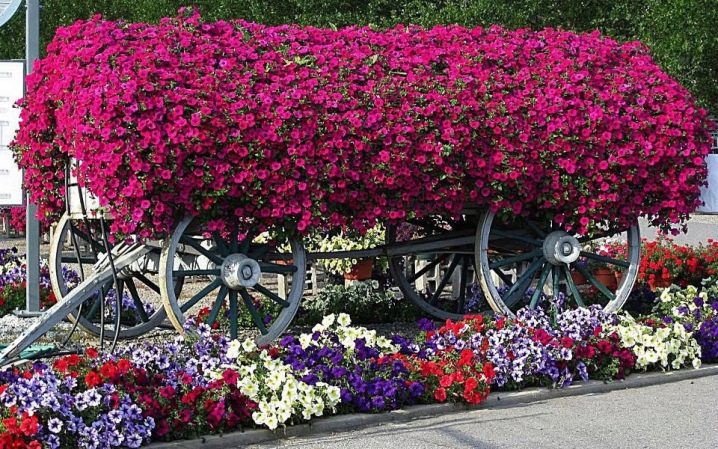
- Flowers populated the log.
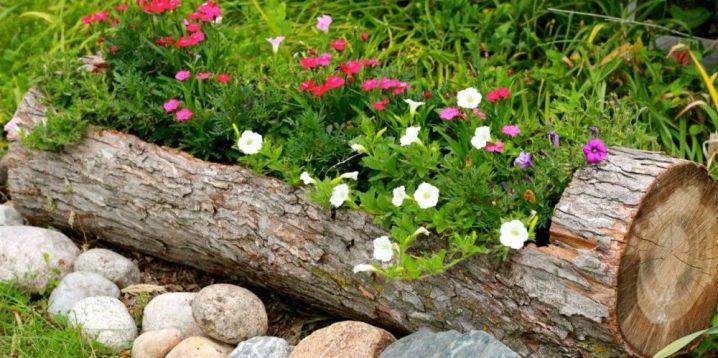
- Petunia has grown on an old tree stump, carefully lacquered by the owners.
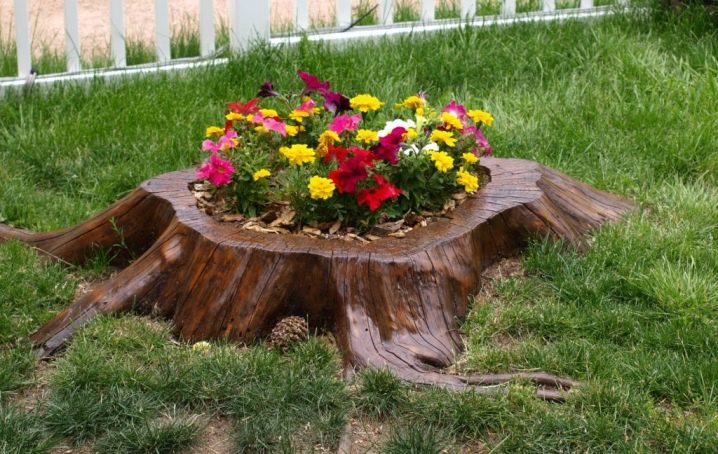
- A flower bed in the form of flowers scattered from a barrel, amphora, can, vase, flower pot.
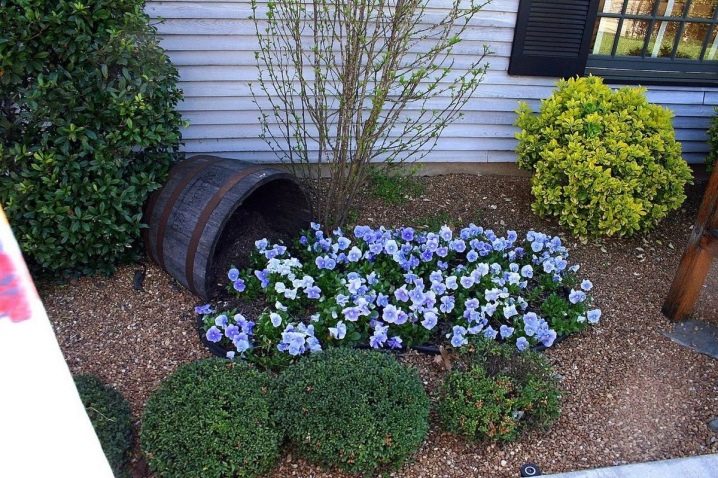
Amazing flowers - petunias. Whatever object they touch, they immediately turn it into a decoration of landscape design.
For information on how to care for petunias in the garden, see the video below.




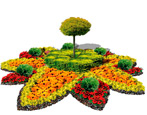
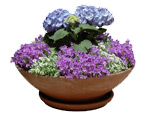
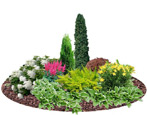
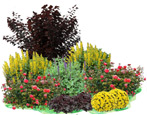
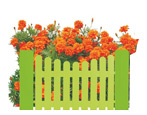
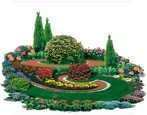
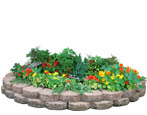
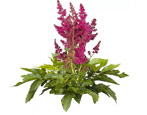

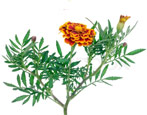
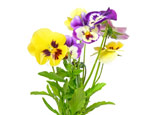

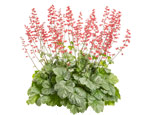
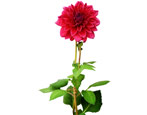
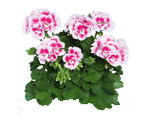
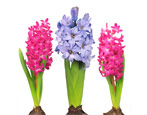
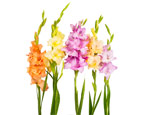

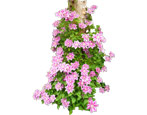
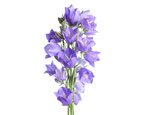
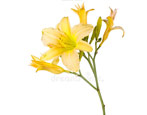
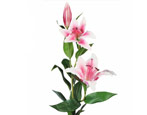
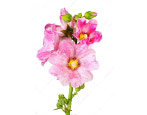
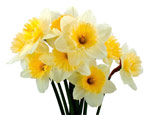
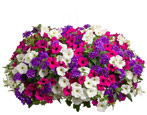
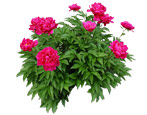
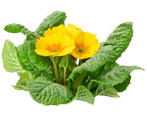
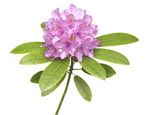
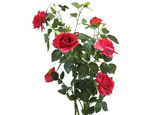
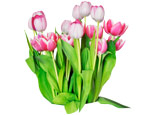
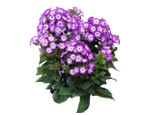
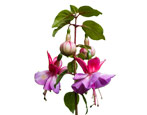
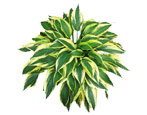
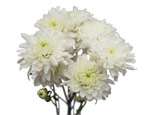
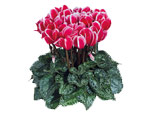
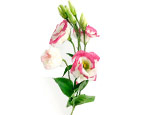































































The comment was sent successfully.